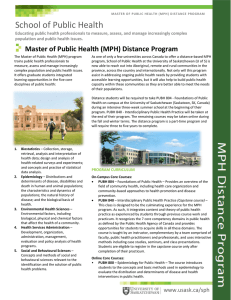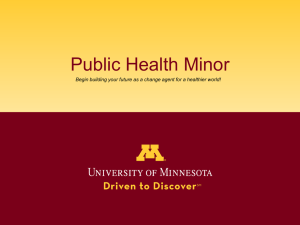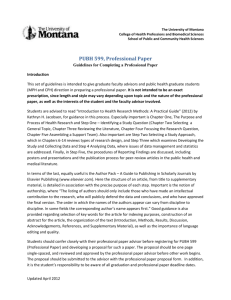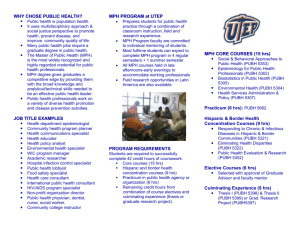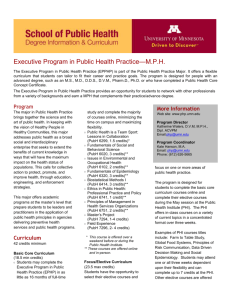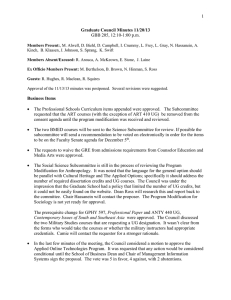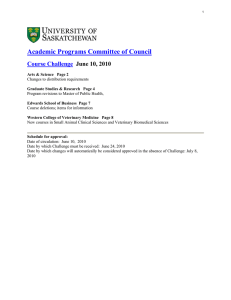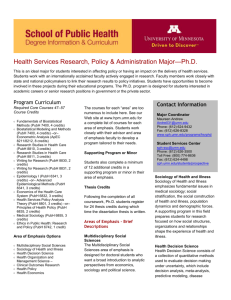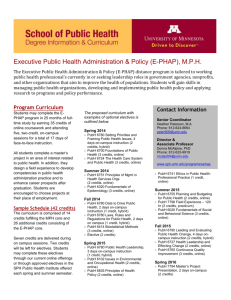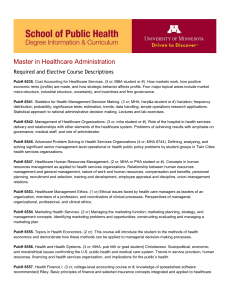Master of Public Health (MPH) Program Brochure
advertisement
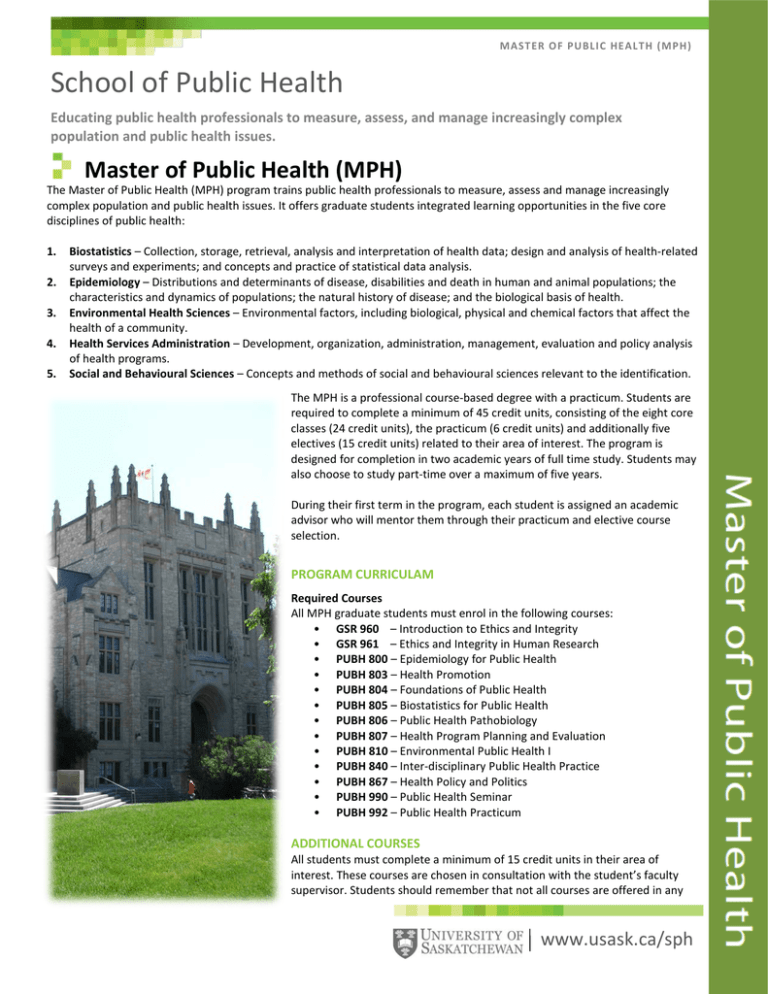
MASTER OF PUBLIC HEALTH (MPH) School of Public Health Educating public health professionals to measure, assess, and manage increasingly complex population and public health issues. Master of Public Health (MPH) The Master of Public Health (MPH) program trains public health professionals to measure, assess and manage increasingly complex population and public health issues. It offers graduate students integrated learning opportunities in the five core disciplines of public health: 1. 2. 3. 4. 5. Biostatistics – Collection, storage, retrieval, analysis and interpretation of health data; design and analysis of health-related surveys and experiments; and concepts and practice of statistical data analysis. Epidemiology – Distributions and determinants of disease, disabilities and death in human and animal populations; the characteristics and dynamics of populations; the natural history of disease; and the biological basis of health. Environmental Health Sciences – Environmental factors, including biological, physical and chemical factors that affect the health of a community. Health Services Administration – Development, organization, administration, management, evaluation and policy analysis of health programs. Social and Behavioural Sciences – Concepts and methods of social and behavioural sciences relevant to the identification. The MPH is a professional course-based degree with a practicum. Students are required to complete a minimum of 45 credit units, consisting of the eight core classes (24 credit units), the practicum (6 credit units) and additionally five electives (15 credit units) related to their area of interest. The program is designed for completion in two academic years of full time study. Students may also choose to study part-time over a maximum of five years. During their first term in the program, each student is assigned an academic advisor who will mentor them through their practicum and elective course selection. PROGRAM CURRICULAM Required Courses All MPH graduate students must enrol in the following courses: • GSR 960 – Introduction to Ethics and Integrity • GSR 961 – Ethics and Integrity in Human Research • PUBH 800 – Epidemiology for Public Health • PUBH 803 – Health Promotion • PUBH 804 – Foundations of Public Health • PUBH 805 – Biostatistics for Public Health • PUBH 806 – Public Health Pathobiology • PUBH 807 – Health Program Planning and Evaluation • PUBH 810 – Environmental Public Health I • PUBH 840 – Inter-disciplinary Public Health Practice • PUBH 867 – Health Policy and Politics • PUBH 990 – Public Health Seminar • PUBH 992 – Public Health Practicum ADDITIONAL COURSES All students must complete a minimum of 15 credit units in their area of interest. These courses are chosen in consultation with the student’s faculty supervisor. Students should remember that not all courses are offered in any www.usask.ca/sph The following suggested list is intended only as a guide and may be subject to change. Students are encouraged to review the online course calendar for opportunities and details about additional elective courses. Elective Courses • PUBH 802 – Public Health Protection • PUBH 808 – Introduction to Health Care Management • PUBH 809 – Field Epidemiology • PUBH 832 – Infectious Disease Epidemiology • PUBH 842 – Current Biostatistical Methods Computer Applications • PUBH 843 – Advanced Topics in Analytical Epidemiology, Level III • PUBH 844 – Chronic Disease Epidemiology • PUBH 845 – Clinical Epidemiology • PUBH 846 – Analytic Methods in Epidemiologic Research Level II • PUBH 847 – Studies in Addictions • PUBH 852 – Canada’s Health Care Systems • PUBH 853 – Seminar in Health Care Organizational Regulation and Policy • PUBH 861 – Health, PostSecondary Education and Social Programs: Funding, structure and Reform • PUBH 864 – Health Care Ethics and Law • PUBH 898 – Special Topics: Health Economics • PUBH 898 – Special Topics: Advanced Environmental Public Health • PUBH 898 – Special Topics: Toxicology • PUBH 898 – Special Topics: Emergency Preparedness and Disaster Response • PUBH 898 – Special Topics: Research Methods • PUBH 898 – Special Topics: • Water and Health • PUBH 898 – Special Topics: • Health Care Reform • PUBH 898 – Special Topics: Introduction to Aboriginal Public Health • • • • • • • • • • • • • • AGMD 800 – Public Health and Agricultural Rural Ecosystem (PHARE) online AGMD 801 – Introduction to Occupational Health ANTH 804 – Medical Anthropology CMPT 857 – Readings in Bioinformatics CMPT 830 – Bioinformatics and Computational Biology CMPT 858 – Topics in Modeling and Operations Research NURS 814 – Aboriginal Health Issues NURS 892 – Research Methods NURS 893 – Qualitative Research Methods NUTR 811 – Advances in Public Health Nutrition Research JSGS 802 – Public Finance VLAC 840 – Zoonoses and Food Safety VLAC 881 – Clinical Trial Design and Analysis VTMC 340 – Veterinary Public Health Additionally there are several elective courses offered as Special Topics. APPLICATION QUALIFICATIONS Applicants to the MPH program should hold a bachelor or higher degree in one of the health sciences, life sciences, social sciences or business with a minimally attained cumulative weighted average of 70% or greater in the last two years of study. All candidates must also meet the admission requirements of the College of Graduate Studies and Research at the University of Saskatchewan. For more information on admission requirements, please visit www.usask.ca/sph. APPLICATION DEADLINE The MPH program offers one starting date in August every year. Application deadline for the program is March 1st, with application reviews occurring in the spring. CAREER PATH “A graduate degree in Public Health for me is not an afterthought but rather a thoughtful and calculated decision with the intention to unify all of my past degrees into an utilizable form that can be of great benefits to the society at large. The interdisciplinary nature of the program makes it valuable in broadening my horizon in several fields of study and this has been an added advantage in enriching my knowledge. The MPH program in the School of Public Health celebrates diversity and inclusiveness, and is known for her experienced faculty. The flexibility of the program and its applicability to real life makes it a choice for whoever wants a degree that is ever-green and globally relevant.” Bolaji Adeniji – MPH Alumni Many Public Health employers require a graduate degree in public health. An MPH degree emphasizes the use of academic knowledge as a basis for evidence-based public health practice and policy development. The program combines academic learning with opportunities to gain practical experience under the mentorship of public health practitioners. The MPH degree prepares public health professionals for careers in the public, non-profit and private health sectors of the economy. MORE INFORMATION For more information regarding our program, courses, prerequisites, and tuition fees, please visit: Website: www.usask.ca/sph Email: sph.admissions@usask.ca
